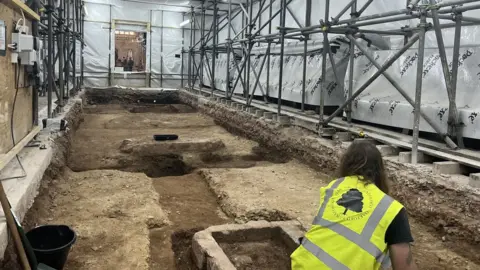Exeter Cathedral dig reveals crypt and bishops' tombs
 Exeter Cathedral
Exeter CathedralArchaeological excavations at Exeter Cathedral have uncovered hidden features from the building's Norman past, project leaders have said.
Experts said they were now certain they had found the foundations of the cathedral's original high altar from the early 12th Century.
An area thought to be a crypt and tombs have also been unearthed.
The dig, in the cathedral's quire [choir] area, has been carried out before underfloor heating is installed.
'Exciting archaeological discovery'
Tombs of what are thought to be bishops from the 12th Century and 13th Century have been unearthed.
Two empty tombs excavated are thought to be those of bishops Robert Warelwast and William Brewer, whose remains were moved in 1320.
Cathedral archaeologist John Allan said: "We have found the buried floors of the Norman cathedral, last seen about 700 years ago, with the original high altar.
"Behind the altar, to the east, is a surprisingly deep backfilled area which we think must be a Norman crypt.
"This is surely the most exciting archaeological discovery ever made at Exeter Cathedral."
The cathedral was founded in 1050, with most of the existing building developed from the 12th Century to the 14th Century.
In an earlier dig, archaeologists investigating the cathedral's historic cloister garden discovered the remains of an early Roman street and timber buildings, and a wall of a Roman town house.
They described the find as "new clues to Exeter's distant past".

Follow BBC News South West on Twitter, Facebook and Instagram. Send your story ideas to [email protected].
